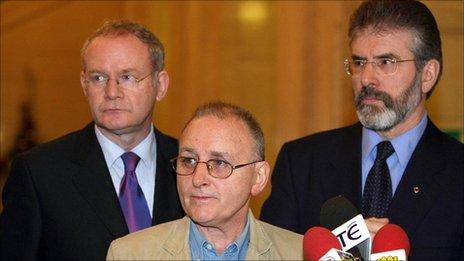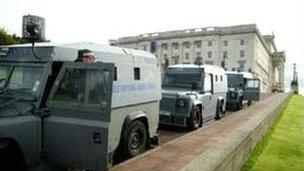Profile: Who was Denis Donaldson?
- Published

Martin McGuinness, Denis Donaldson and Gerry Adams at a Sinn Fein party conference in 2005
Denis Donaldson was once a key figure in Sinn Fein's rise as a political powerhouse in Northern Ireland but he was found brutally murdered in 2006 after it emerged he had been a spy.
As with many other senior member of Sinn Fein from the era, Mr Donaldson was interned for periods during the 1970s.
From 1971, people suspected of involvement with paramilitaries were interned without trial.
Over the years, Mr Donaldson became a trusted and respected senior Sinn Fein figure, close to both party president Gerry Adams and chief negotiator Martin McGuinness.
Ceasefire
Following the Good Friday Agreement and the eventual devolution of power to Northern Ireland, Sinn Fein appointed Mr Donaldson as their key administrator in the party's Stormont offices.
It was a key role - co-ordinating the party's tactics and business in the troubled power-sharing arrangements.
But during this time he also led a double life as an agent for the British intelligence services.
For two decades, Mr Donaldson, was a key informer at the heart of Sinn Fein's political machinery.
He played this role during the crucial years when the republican movement began the slow shift away from an armed campaign, leading ultimately to the IRA's ceasefire and dumping of its arms.
His double life was revealed in 2002 after the fall-out from the controversial circumstances of a police raid on Sinn Fein's Stormont offices, amid allegations of a republican spying ring.
That raid led to the suspension of the power-sharing executive after unionists declared they could no longer trust Sinn Fein and threatened to quit.
Three men, one of them Mr Donaldson, were arrested at the time - but late in 2005 prosecutors said they were dropping all charges "in the public interest".
Activities
That public interest became clear when days later Mr Donaldson confessed publicly to being a British agent, an admission that led to his immediate expulsion from Sinn Fein and republican circles.
In a statement in December 2005, Mr Donaldson confirmed that he had been an agent at the time of the raid and he apologised to his "former comrades" and family.
"I was recruited in the 1980s after compromising myself during a vulnerable time in my life," he said.
"Since then, I have worked for British intelligence and the [Police] Special Branch.
"Over that period I was paid money. My last two contacts with Special Branch were as follows: two days before my arrest in October 2002, and last night, when a member of Special Branch contacted me to arrange a meeting.
"I was not involved in any republican spy ring at Stormont - I deeply regret my activities with British intelligence and Special Branch."
At the time, Gerry Adams claimed that Mr Donaldson had spoken out because he was about to be "outed" by police officers determined to deflect attention from the raid.
But the republican movement, secretive and often clan-like, was utterly shocked by the revelation.
Denis Donaldson disappeared from the Belfast political scene almost immediately after the revelations.
Blueprint

Police raided Sinn Fein's Stormont offices in 2002
Past informants - dubbed "touts" in republican circles - were usually tortured, interrogated and shot by the IRA.
But a Dublin-based newspaper tracked him down to a tiny, run-down house in the hills of County Donegal's north west coast.
Mr Donaldson was living in squalid conditions in a remote cottage near the villages of Glenties. He had no contact with the outside world and no police protection.
In April 2006 Mr Donaldson's body was found at the cottage.
His death came hours before a planned visit to Northern Ireland by the then British and Irish prime ministers, Tony Blair and Bertie Ahern, to unveil their blueprint for reviving the assembly at Stormont.
After his murder, the IRA issued a statement saying it had "no involvement whatsoever" in Mr Donaldson's death.
A preliminary inquest into Mr Donaldson's death was opened in November 2007 but has so been delayed on a number of occasions.